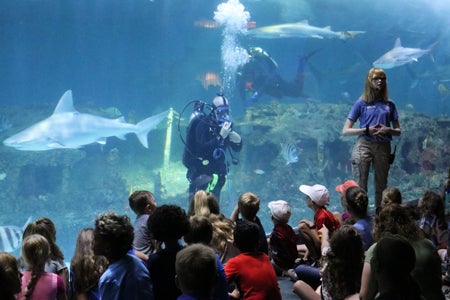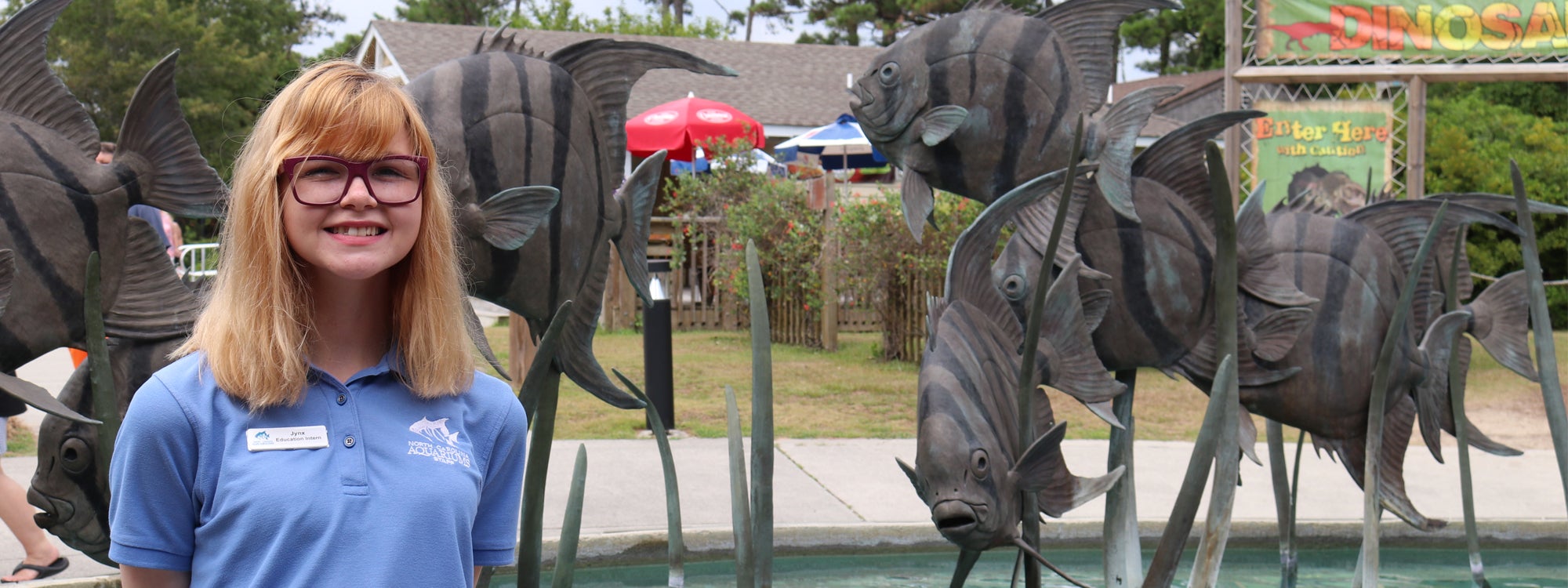Intern educates at aquarium
A hush falls across a darkened room at the North Carolina Aquarium on Roanoke Island in Manteo.
Seated in front of the aquarium’s “Graveyard of the Atlantic” exhibit, a group of children huddle together as schools of fish dart in and out of the exhibit’s sunken warship.
Suddenly, “oohs” and “ahhs” fill the room as a 300-pound sand tiger shark swims toward the crowd. While many are captivated by the shark’s impressive size and mouth full of razor sharp teeth, it’s the exhibit’s presenter that steals the show.

Jynx Coleman leads an educational presentation at the aquarium’s “Graveyard of the Atlantic” exhibit.
Led by East Carolina University undergraduate Jynx Coleman, the aquarium’s visitors are treated with a presentation on the three species of sharks and nearly 100 different fish that call the “Graveyard of the Atlantic” exhibit home. Coleman, a summer intern at the vacation destination in the Outer Banks, connected with the aquarium through ECU’s Office of Community Engagement and Research’s SECU Public Service Fellows internship program.
The program, now in its third year, joins the university with regional communities through projects that address community-identified priorities. Undergraduate student placements provide opportunities for fellows to develop leadership, analytical, problem solving, communication and project management skills, as well as allowing them to network in professional settings.
Coleman, a biology major who’s also minoring in psychology, said she didn’t know if she fit into the program at first, but was able to find a home with the aquarium.
“I honestly didn’t expect the SECU program to have something for (a science student),” the rising junior said. “I’m currently set-up to go pre-med for psychology, but I’m also considering going into education. However, I wanted to be able to learn how to handle lots of different people because it’s useful in both the medical and educational fields. In either one, you’re working with people of all different backgrounds and ages.”
As part of her internship duties, Coleman is trained to handle 30 different animals, including snakes, turtles, salamanders and scorpions. She also works with the aquarium’s horticulture and husbandry divisions, while participating in off-site experiences like releasing sea turtles, banding pelicans for research data and beach cleanups.
A major part of Coleman’s internship experience includes interacting with aquarium visitors during educational presentations like her “Graveyard of the Atlantic” presentation. The aquarium received more than 300,000 visitors in 2017.
“You’re acting as the face of the education department when you’re leading exhibits,” Coleman said. “You’re translating knowledge and education to the public sector. You have to learn to convey that message to the public. I had no experience doing that, but I wanted that experience. Being able to pass along knowledge in a way that’s easier to understand and remember is a valuable skill.”
Paul Mazzei, a marine science educator at the aquarium, said having fresh ideas that interns like Coleman brings is a valuable resource in his team’s program planning.
“Having a critical eye that isn’t used to doing these programs 100 times throughout the year is especially useful,” Mazzei said. “Just to say, ‘Hey, the flow of this or the timing of that needs to be changed’ is helpful for us.
“To be honest, in the summertime we’re able to reach so many more people thanks to Jynx,” he said. “Our reach is so much larger. That’s huge for the aquarium. Just having more people out there on the floor answering questions and interacting with visitors, it really enhances the quality of the aquarium experience. Our exhibits team is awesome, but we need people like Jynx to share these experiences with them to advance our mission.”
For Coleman, the experience of leading visitors through shark-inhabited exhibits isn’t something she’ll soon forget.
“If you asked me last year if I’d be spending the summer at an aquarium leading exhibits, I wouldn’t have believed it would be possible,” she said. “I never thought I’d be here. I thought I was going to have a difficult time getting in and getting adjusted, but it’s been a wonderful process. It’s the best job I’ve ever had.”
To learn more about the Public Service Fellows program, visit the program online. The North Carolina Aquarium on Roanoke Island is open from 9 a.m. to 5 p.m. daily.
